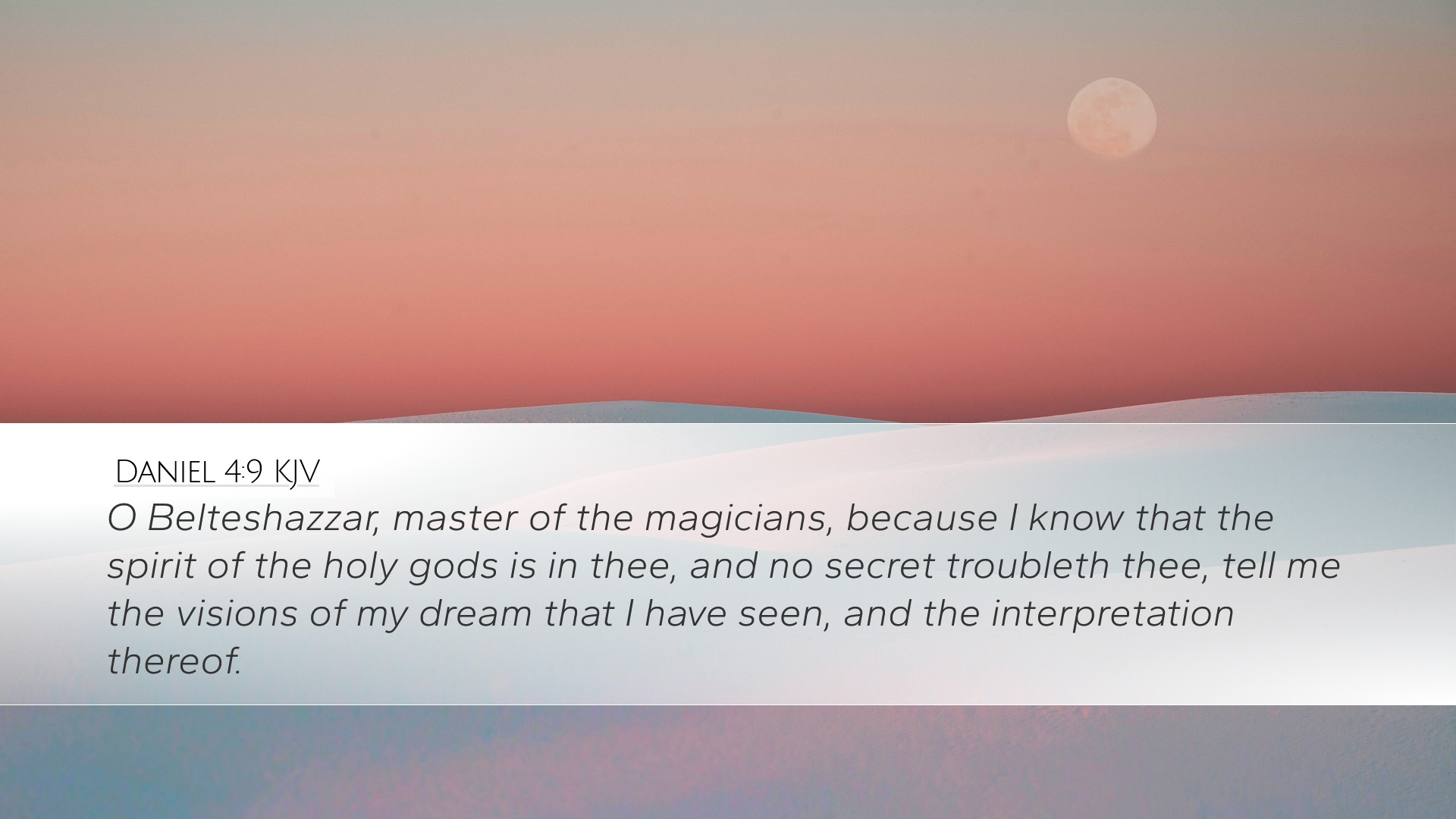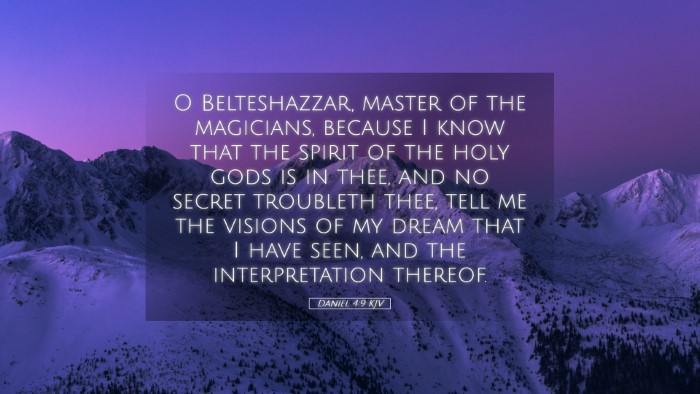Commentary on Daniel 4:9
The verse under consideration, Daniel 4:9, presents an intriguing glimpse into the prophetic vision experienced by King Nebuchadnezzar. This commentary aims to synthesize insights from various public domain sources and offer a profound understanding suitable for pastors, students, theologians, and Bible scholars.
Contextual Overview
This particular chapter of Daniel depicts a significant transformation in the life of King Nebuchadnezzar, establishing the narrative within the broader context of divine sovereignty and the consequences of pride. Daniel 4 recounts Nebuchadnezzar's dream about a great tree, which serves as a metaphor for his kingdom and exaltation, followed by a prophetic declaration of his impending humbling.
Analysis of the Verse
In Daniel 4:9, the verse states:
"O Belteshazzar, master of the magicians, because I know that the spirit of the holy gods is in thee, and no secret troubleth thee, tell me the visions of my dream that I have seen, and the interpretation thereof."
The Address to Belteshazzar
Matthew Henry notes that Nebuchadnezzar refers to Daniel by his Babylonian name, Belteshazzar, indicating his place among the wise men of Babylon and highlighting the king's reliance on Daniel for interpreting his dreams.
The title "master of the magicians" suggests an acknowledgment of Daniel's exceptional wisdom and God-given insight, contrasting with the failure of other wise men (as discussed in Albert Barnes's commentary).
The Divine Spirit in Daniel
Henry explains that Nebuchadnezzar's recognition of "the spirit of the holy gods" within Daniel reveals the king’s understanding of divine revelation, despite his polytheistic background. This term, "holy gods," lacks the full understanding of the singular, sovereign God as recognized in the Hebrew Scriptures.
Adam Clarke elaborates on the significance of this acknowledgment, emphasizing how it illustrates God's providence over worldly affairs and demonstrates that even a leader such as Nebuchadnezzar can discern the presence of divine wisdom in someone who serves the true God.
Request for Interpretation
In this verse, Nebuchadnezzar implores Daniel to interpret his dreams. This act of seeking interpretation signifies both desperation and acknowledgment of the inadequacy of other magicians. As Barnes points out, it also shows the king's awareness of the profound implications of his dream and the realization that true wisdom lies beyond earthly capacity.
This moment also reflects the interplay between human authority and divine revelation—a common theme in Biblical narratives. Nebuchadnezzar, often portrayed as a proud king, illustrates the biblical truth that God uses the humble and faithful for His purposes, as evidenced in Daniel.
Theological Implications
The Nature of Wisdom
Drawing from these commentaries, we must recognize how true wisdom stems from a relationship with God. The verse encapsulates the essence of divine wisdom, which transcends human understanding. Pastoral application here would emphasize guidance through prayer and a deep reliance on God’s Spirit in times of uncertainty.
The Sovereignty of God
The narrative surrounding this verse is a reminder of God’s overarching sovereignty. Adam Clarke emphasizes that the unfolding events demonstrate how God governs the affairs of men, directing kings according to His will. For theologians, this underscores the importance of understanding God's providence and how He uses individuals to unveil His plans.
The Role of the Believer
As students and scholars of Biblical texts reflect on Daniel's role, it becomes crucial to consider the call to be faithful witnesses of God’s truth in a secular and often hostile environment. Believers are encouraged to seek divine wisdom and respond to the call of those in need of understanding.
Application for Contemporary Readers
In addressing contemporary readers, we recognize that Nebuchadnezzar's plight reflects the human struggle with pride and the need for humility before God. This passage serves as a potent reminder of the follies of human wisdom compared to divine insight.
Challenges of Authority
Those in positions of authority can learn from Nebuchadnezzar's eventual humility. The path toward genuine leadership is often found in recognizing one's limitations and seeking wisdom from sources beyond one’s self.
The Importance of Seeking Godly Counsel
This verse urges believers to seek counsel from those who are grounded in faith, as Daniel was. Engaging with mentors and devoted Christians can provide essential guidance needed in complexity.
Conclusion
Daniel 4:9 functions as a profound intersection of divine revelation and human authority. It serves as a reminder that, regardless of one's position in life, the acknowledgment of God's sovereignty and the willingness to seek His wisdom is paramount. As pastors, students, theologians, and scholars dive deeply into this verse, it encourages them to reflect on their own lives and reliance on God’s guidance in their respective journeys.


